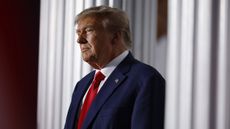Instant Opinion: Land Army needs to be easier for ‘workshy’ Brits to sign up
Your guide to the best columns and commentary on Wednesday 29 April

The Week’s daily round-up highlights the five best opinion pieces from across the British and international media, with excerpts from each.
1. Philip Johnston in The Telegraph
on fruit-picking and farm work
Subscribe to The Week
Escape your echo chamber. Get the facts behind the news, plus analysis from multiple perspectives.

Sign up for The Week's Free Newsletters
From our morning news briefing to a weekly Good News Newsletter, get the best of The Week delivered directly to your inbox.
From our morning news briefing to a weekly Good News Newsletter, get the best of The Week delivered directly to your inbox.
If we want a Land Army, it needs to be easy for ‘workshy’ Brits to sign up
“Many years ago you could just turn up at the farm, ask if there was a job, were shown the ropes and got cracking. Nowadays, fruit farms tend to be far bigger enterprises, training is required, health and safety rules must be followed and swinging the lead is not tolerated in the way it used to be. Let’s face it, students are not the most reliable employees so it is simpler for the growers to hire gang-masters to recruit many thousands of pickers overseas, complete all the paperwork and arrive with plane loads of people willing and able to work hard who are also happy to live together en masse. Earlier this month, around 5,000 were brought in from Romania by charter flight despite the millions here who need a job.”
2. Arwa Mahdawi in The Guardian
on blind loyalty
Trump is unravelling – even his supporters can’t ignore it now
“I don’t know what kind of disinfectant Donald Trump has been injecting, but the man does not appear to be well. The president’s lethal medical musing has turned him into (even more of) a global laughing stock and the widespread ridicule has clearly bruised his fragile ego. While Trump has never been a paradigm of calmness or competence, he has become increasingly irate and erratic in recent days. Now even his diehard supporters seem to be cooling towards him. Is the ‘very stable genius’ starting to unravel?”
3. Kate Murphy in The New York Times
on awkward pauses
Why Zoom is terrible
“Their faces arranged in a grid reminiscent of the game show ‘Hollywood Squares’, people are attending virtual happy hours and birthday parties, holding virtual business meetings, learning in virtual classrooms and having virtual psychotherapy. But there are reasons to be wary of the technology, beyond the widely reported security and privacy concerns. Psychologists, computer scientists and neuroscientists say the distortions and delays inherent in video communication can end up making you feel isolated, anxious and disconnected (or more than you were already). You might be better off just talking on the phone.”
4. Ulises Ali Mejias and Nick Couldry in Al Jazeera
on unhelpful simplifications
Resistance to the new data colonialism must start now
“We are told this is a time of hard choices, a time when emergency tracking measures via our digital devices are necessary if any return to normal life post-COVID-19 is possible. We are told that one part of the planet (‘the East’) had these surveillance measures imposed on them by authoritarian states, while the other part (‘the West’) has the chance to ‘opt in’ to solutions which supposedly respect their privacy. Even if the East/West contrast were not already an oversimplification, it illuminates little, because the very same dynamic underlies both approaches: a new colonial push to convert all of human life into streams of data for economic value and political power.”
–––––––––––––––––––––––––––––––For a round-up of the most important stories from around the world - and a concise, refreshing and balanced take on the week’s news agenda - try The Week magazine. Start your trial subscription today–––––––––––––––––––––––––––––––
5. Ali Al-Ahmed in The Independent
on an uneasy alliance
I’m a long-time Saudi dissident — Newcastle United have no idea what they’re getting into
“The notion that Newcastle United’s new owners would use their cash to transform the club into a football powerhouse along the lines of Manchester City is a pipe dream. With the price of oil tumbling to below $20 per barrel, Saudi Arabia is bleeding money, and the twin shocks of oversupply and crashing demand in energy markets mean that this hemorrhaging will continue for some time to come. The stewards of Saudi Arabia’s economy will soon come under strong domestic pressure to devote their shrinking resources to the welfare of their own citizens, rather than to high-priced transfer fees.”
Create an account with the same email registered to your subscription to unlock access.
Sign up for Today's Best Articles in your inbox
A free daily email with the biggest news stories of the day – and the best features from TheWeek.com
-
 Death Cafe: where people talk mortality over tea and cake
Death Cafe: where people talk mortality over tea and cakeWhy everyone's talking about The meet-ups are intended to offer a judgement-free and respectful space to discuss the end of life
By Chas Newkey-Burden, The Week UK Published
-
 Mark Menzies: Tories investigate MP after 'bad people' cash claims
Mark Menzies: Tories investigate MP after 'bad people' cash claimsSpeed Read Fylde MP will sit as an independent while party looks into allegations he misused campaign funds on medical expenses and blackmail pay-out
By Arion McNicoll, The Week UK Published
-
 'Another day of chaos in DC'
'Another day of chaos in DC'Today's Newspapers A roundup of the headlines from the US front pages
By The Week Staff Published
-
 'Dirty work' to retrieve cash eaten by a dog
'Dirty work' to retrieve cash eaten by a dogTall Tales And other stories from the stranger side of life
By Chas Newkey-Burden, The Week UK Published
-
 Flies attack Donald Trump
Flies attack Donald TrumpTall Tales And other stories from the stranger side of life
By Chas Newkey-Burden, The Week UK Published
-
 Donald Trump criminal charges for 6 January could strain 2024 candidacy
Donald Trump criminal charges for 6 January could strain 2024 candidacySpeed Read Former president’s ‘pettifoggery’ won’t work well at trial, said analyst
By Chas Newkey-Burden Published
-
 How Gibraltar became the last frontier of Brexit
How Gibraltar became the last frontier of Brexitfeature A Spanish election victory for conservatives could spell disaster for UK-Spain sovereignty deal over the ‘Rock’
By Harriet Marsden Published
-
 Donald Trump in the dock: a fraught moment for US democracy
Donald Trump in the dock: a fraught moment for US democracyTalking Point There is speculation that former president could end up running his 2024 election campaign from behind bars
By The Week Staff Published
-
 Donald Trump indicted again: is latest threat of prison a game changer?
Donald Trump indicted again: is latest threat of prison a game changer?Today's Big Question The former president ‘really could be going to jail’ but Republicans ‘may not care’ say commentators
By Chas Newkey-Burden Published
-
 Trump told he could face charges over classified Mar-a-Lago documents
Trump told he could face charges over classified Mar-a-Lago documentsSpeed Read A second criminal indictment is on the cards for the former US president and current Republican frontrunner
By Sorcha Bradley Published
-
 Beano comics sent to Australia
Beano comics sent to Australiafeature And other stories from the stranger side of life
By Chas Newkey-Burden Published